|
|
|
Sort Order |
|
|
|
Items / Page
|
|
|
|
|
|
|
| Srl | Item |
| 1 |
ID:
154356
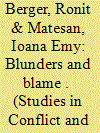

|
|
|
|
|
| Summary/Abstract |
Armed non-state actors make mistakes. Why this phenomenon occurs, and how organizations respond to their blunders, has remained understudied. This article draws on interdisciplinary research to examine sources of errors, and offers a public sensitivity argument to explain why groups claim and even apologize for their blunders. The quantitative analysis finds that all armed groups, regardless of ideology and organizational structure, are willing to apologize when there are unintended high casualty rates. A detailed analysis of three Provisional Irish Republican Army incidents reveals that public opinion is sensitive to the nature of the victims, and shows how public condemnation can impact organizational behavior.
|
|
|
|
|
|
|
|
|
|
|
|
|
|
|
|
| 2 |
ID:
173737
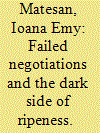

|
|
|
|
|
| Summary/Abstract |
This article revisits ripeness theory and examines whether conflicts with armed Islamist groups can also be ripe for negotiation. The article argues that armed Islamist organizations can be willing to negotiate and demobilize, but talks are particularly vulnerable to spoilers and public backlash. To examine these dynamics, the article investigates the case of al-Gama’a al-Islamiyya in Egypt. Relying on a variety of primary and secondary sources, including organizational documents and testimonies by the leaders, the analysis shows that the absence of ripeness can indeed explain some of the failures of negotiations. However, when the conflict was finally ripe, talks broke down because of elite divisions and public backlash. The case reveals that there is a dark side to ripeness: the conditions that lead to a mutually hurting stalemate can also lead to public outrage, elite divisions, and opposition to negotiations.
|
|
|
|
|
|
|
|
|
|
|
|
|
|
|
|
| 3 |
ID:
171799
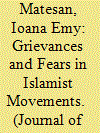

|
|
|
|
|
| Summary/Abstract |
This article examines how exclusionary policies and repressive measures affect the propensity of Islamist groups in nondemocratic settings to engage in violence. The central argument is that exclusion from electoral politics, from civil society, and from public discourse can increase political grievances, whereas symbolic threats to religious values spark sociocultural grievances; state violence and repression foster a sense of insecurity. The article proposes that Islamist groups are both principled and strategic actors, who may adopt violent rhetoric in response to political or sociocultural grievances, but who resort to violent tactics primarily out of a sense of insecurity. The quantitative examination of twenty-two Islamist groups from the Middle East confirms that exclusionary policies can spark violent rhetoric, whereas repression and threats to the physical integrity of a group increase the propensity toward violent behavior. However, when insecurity turns into disillusionment, groups can also move away from violence if they feel alienated from the public. The close investigation of the Muslim Brotherhood and al-Gama'a al-Islamiyya in Egypt shows that the response to repression depends on the length of the conflict, the level of fragmentation within an organization, and public opinion.
|
|
|
|
|
|
|
|
|
|
|
|
|
|
|
|
| 4 |
ID:
175706
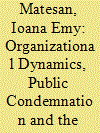

|
|
|
|
|
| Summary/Abstract |
This article examines under what conditions armed Islamist groups intentionally demilitarize and de-legitimize violence, and under what conditions they deprioritize violence temporarily. The central argument is that the decision to de-escalate is driven by the interaction between political context, organizational dynamics and public attitudes. When violence becomes costly and non-violent alternatives are available, groups have incentives to pause armed action, but they do not necessarily feel the pressure to change their ideological tenets or permanently renounce military capabilities. However, when organizational weakness reaches a point of crisis, and when the public explicitly condemns groups, leaders are faced with a sink or swim scenario that forces them to reconsider the role of armed action and the very mission of the group. The ability of leaders to impose any changes in the behavior, ideology or organizational structure depends on the cohesion of the organization. Internal fragmentation can lead to behavioral escalation, but it can also eliminate the most hardline elements from a group, which facilitates organizational transformations from the top. The empirical discussion traces the complete demilitarization and renouncement of violence within the Egyptian Gama’a Islamiyah, and the more hesitant deprioritization of violence within the Indonesian Jama’a Islamiyah.
|
|
|
|
|
|
|
|
|
|
|
|
|
|
|
|
| 5 |
ID:
086738
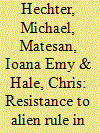

|
|
|
|
|
| Publication |
2009.
|
| Summary/Abstract |
Although alien rule is widely assumed to be illegitimate, nationalist resistance to it varies across time and space. This article explores why there was greater nationalist resistance to Japanese colonial rule in Korea than Taiwan from the turn of the twentieth century to the end of World War II. Resistance to alien rulers requires both a supply of participants in nationalist collective action and a demand for national self-determination. The article assesses two principal propositions: (1) that the supply of participants increases to the degree that native elites are stripped of their traditional authority and offered few incentives to collaborate; and (2) that the demand for national self-determination decreases to the degree that alien rule is fair and effective. A comparative analysis of the effects of Japanese alien rule in Taiwan and Korea suggests that nationalist resistance is greater in the earliest phases of occupation, that the greater native elites' opportunities, the weaker the resistance to alien rule; and that the fairer the governance, the weaker the resistance to alien rule.
|
|
|
|
|
|
|
|
|
|
|
|
|
|
|
|
| 6 |
ID:
116338
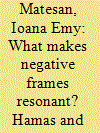

|
|
|
|
|
| Publication |
2012.
|
| Summary/Abstract |
Increasingly, scholars are applying Social Movement Theory to explore how radical Islamist groups strategically employ framing to legitimize the use of violence. What has not been explicitly examined, however, is under what conditions radical frames are more resonant with the public than more moderate alternatives. This article argues that the strength of a particular frame depends on the credibility of the competing claim-makers. Drawing on public opinion polls from the Palestinian Territories, the article shows that the resonance of Hamas' frames vis-à-vis the peace process between 1993 and 2006 depended on the ability of the Palestinian leadership to maintain its legitimacy. Since the Gaza take-over and Hamas' shift to a position of leadership rather than opposition party, the organization's inability to deliver in the economic realm or to even feign any progress regarding the peace process damaged its credibility and reputation. Accordingly, its frames vis-à-vis the peace process also started losing their resonance with the public. An understanding of the dynamics of credibility can also help explain the continued moves towards national reconciliation between Hamas and Fatah.
|
|
|
|
|
|
|
|
|
|
|
|
|
|
|
|
|
|
|
|
|